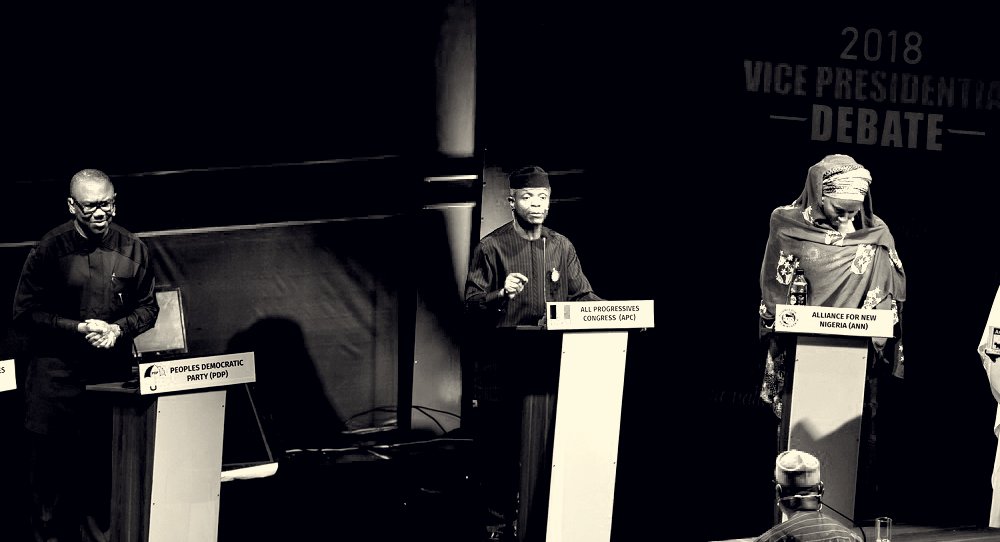This issue brief provides background on a Bill seeking to make debates compulsory for candidates running for the offices of President, Vice President, Governor, and Deputy Governor.
Issue-Brief | Rachel Ogidan
Candidates' debates have been correctly described as the centrepiece of democracy worldwide, and over 87 nations have incorporated a debate tradition. This tradition transcends and cuts across jurisdictions, irrespective of their levels of social and economic development.
Among the reasons for the proliferation of the indispensable tradition is the conviction that debates increase political accountability, and strengthens emerging as well as traditional democracies.
Despite the numerous benefits that candidates' debates offer, particularly for presidential candidates, it has not been embraced as a tradition in Nigeria and is treated with distasteful levity. For instance, the incumbent President refused to engage in the presidential debate during the contest for both his first and second tenure, despite a clamour for the same by concerned electorates, an action that may be construed as a disregard for political accountability. However, from a legal standpoint, the President was not in breach of any existing law.
In an attempt to curb this dire situation, promote accountability, reduce political apathy, and inform voters, the National Assembly introduced a Bill seeking to amend the Electoral Act. This issue brief will concisely examine the Electoral Act Amendment, Bill 2020 (SB.176), as well as its potential impacts on elections.
What the Bill Says
The Bill, which has passed the second reading, and has been referred to the Committee on Independent National Electoral Commission (INEC) for further legislative action, seeks to make debates mandatory for candidates running for the offices of President, Vice President, Governor and Deputy Governor.
When passed into law, the Bill would give legislative backing to INEC to organise and conduct debates for candidates running for the offices mentioned above. The implication of this is that the discretion otherwise previously exercised by candidates is withdrawn, and prospective candidates running for key offices would be compelled by the law to engage in debates.
The sponsor of the Bill, Senator Buhari Abdulfatai in the lead debate for the Bill averred that the amendment of the Act and inclusion of the provisions empowering the Electoral Commission to organise debates would strengthen the Nation’s democracy and bring it in conformity with practices obtainable in other renowned jurisdictions and democracies of the world.
He maintained that debates are essential in enabling electorates to know the candidates, their positions on national issues, and foreign policies, as well as help the electorates votes along ideological lines rather than ethnic or religious allegiance among others.
Impact of the Amendment
Broadly, a candidate debate describes a neutral forum where individuals competing for elected offices address the questions raised by the voters, moderators, and other debaters. Essentially, the debates are important for creating an avenue for constructive dialogue and interactions among the candidates. It avails voters the opporturnity to do a comparative analysis of the respective candidates.
There is a dearth of data on electoral behaviour in Nigeria, and as such, the impact of the Bill on voter behaviour may be speculatory. Nonetheless, an examination of the impact of mandatory debates in other democracies is a reflection that the Bill might indeed be a step in the right direction in curing Nigeria’s electoral apathy.
Debates have become an inherent part of American democracy, and presidential debates have become a major event with millions of viewers. Over the years, a correlation has successfully been drawn between the debates and voters behaviour, and Data by the Pew Research Center illustrates that presidential debates have the capacity to influence up to 67% of voters. What started as a western tradition has become incorporated even among the African States, including South Africa, Ghana, Sierra Leone, among others, with such countries experiencing a reduction in electoral apathy.
The 2019 presidential election was characterised by the lowest recorded turnouts of voters, estimated at 37.4%, with even lower numbers appearing for the gubernatorial election. A situation described as “Nigerians turning against democracy.” These alarming figures highlight the urgency of protecting and strengthening our bambino democracy.
Statutorily mandating candidate debates for key officials is an efficacious tool in de-escalating political and electoral apathy, as demonstrated by other jurisdictions. The premise for this is that debates are generally conceived as an inkling of a transparent, fair, and open election process. Succinctly, they are the benchmarks of a healthy democracy!
Conclusion
A free and fair election is imperative for the sustainability of any democratic society, and debates by candidates are key in providing a platform for the electorates to have a grasp of the approach of each candidate to socio-economic issues.
Thus, the importance of debates cannot be over-emphasised. It is, therefore, necessary to ensure that debates are made compulsory for candidates as a means of entrenching democratic ideals in both citizens and candidates. The Bill is, therefore, laudable, as an attempt to help citizens make more informed choices at the polls.
This is part of our series on #ThereIsABillinTheHouse.
This issue brief was provided by
Rachel Ogidan | Research Assistant, Governance & Political Institutions | r.o@borg.re
Our issue-briefs provides a platform to provide commentaries on knowledge surrounding a current relevant local or transnational discussion.
Disclaimer
The opinions expressed are the sole responsibility of the authors and do not necessarily represent the official position of borg.
The ideas expressed qualifies as copyright and are protected under the Berne Convention.
Reproduction and translation for non-commercial purposes are authorised, provided the source is acknowledged and the publisher is notified.
©2020 borg. Legal & Policy Research

